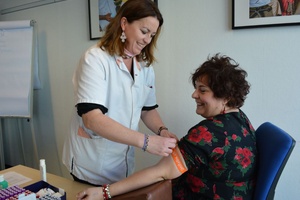Stop TB Partnership staff get tested for TB: A call for universal access to TB testing
12 March 2015 -- Geneva, Switzerland -- In an initiative to highlight that there should be no stigma associated with tuberculosis (TB) and that anyone could be infected with TB no matter where they live, the Stop TB Partnership Secretariat staff, colleagues from UNOPS and the Global Fund to Fight AIDS, Tuberculosis & Malaria are today getting tested through an interferon gamma release assay (test) that will determine if the person is infected with latent TB.

Dr Lucica Ditiu, Executive Secretary of the Stop TB Partnership is today getting tested through an interferon gamma release assay (test) that will determine if the person is infected with latent TB.
People with latent TB are healthy individuals that carry the mycobacterium tuberculosis encapsulated in the body. They have only a 10 percent chance to develop the disease (“active TB”) throughout their lifetime and they would only become infectious to others if they developed the disease. Worldwide, an estimated 2 billion people are infected with latent TB.
The global health community has set itself the task of ending TB as a public health problem by 2035. Although progress has been made in the global TB arena, the current decline in incidence of less than 2% a year is far from the rate needed to achieve this.
The benefits of testing for latent TB and the advantages of early TB case detection are many, and the testing of Stop TB Partnership and other staff aims to draw attention to the importance of knowing one’s status of infection and disease as well as the importance of having access TB prevention, treatment and care should there be a positive result.
Treatment of individuals with active TB disease is the first priority for TB interventions. However, identifying and possibly treating individuals with latent TB infection, especially in specific vulnerable groups and country contexts, is also important.
Staff at the Stop TB Partnership Secretariat, the Global Fund Secretariat and UNOPS will know their test results and status of TB infection within a few days. If a person is found to be infected with TB bacteria, other tests and follow-up are needed to see if the person is actually ill or simply have latent TB.
“With World TB Day just over a week away, we wanted to do something different this year in Geneva to spread the idea that TB is not an easy disease to defeat, with high reservoirs of infected people. We wanted to show that anyone can be infected with TB and that there should be no stigma associated with the TB infection or TB disease status,” said Dr Lucica Ditiu, Executive Secretary of the Stop TB Partnership.
“I am grateful to my entire team, colleagues at UNOPS and Global Fund who after appropriate discussions and counselling, have opted to be tested. I would like to see the day in my lifetime when we can offer the same attention and access to services to everyone – and where one is born or how much one earns no longer determine whether you live or die.”
About TB (adapted from CDC website http://www.cdc.gov/tb/)
TB is a bacterial disease which usually attacks the lungs, but can also attack other parts of the body, such as the kidney, spine or brain. TB is spread through the air from one person to another. In most people who become infected, the immune system is able to stop the TB bacteria from multiplying. People with latent TB infections do not feel sick and cannot spread TB bacteria to others. However, the TB bacteria can evade your immune response and begin to grow. Some people may develop disease soon after becoming infected, while others become sick many years later when their immune systems weaken. However, many people with latent TB infections never develop TB disease.
There are two kinds of tests that are used to determine if a person has been infected with TB bacteria: the tuberculin skin test and TB blood tests. This is different from active TB disease, which is diagnosed following a physical exam including a sputum test (smear microscopy, Xpert MTB/RIF or culture) and/or a chest x-ray. TB is treated by taking a combination of several drugs, as recommended by a healthcare provider. The decision to take preventative treatment for latent TB infections should be based on a person’s chance of developing active TB disease.
About the Stop TB Partnership
The Stop TB Partnership is a unique international body within the UN family with the power to align actors all over the world in the fight against TB. It has evolved into a large global coalition of more than 1200 partners across 100 countries. The Partnership ensures a voice for the TB community at the highest levels. The various grant programs of the Partnership identify and fund innovative approaches to find and treat new TB cases. It plays a key role in procuring TB drugs and diagnostics across the world. Its market-shaping abilities help reduce prices, improve forecasting and prevent stock-outs of drugs. It invests much of its efforts in assisting the largest international donor for TB, The Global Fund to Fight Aids Malaria and TB, which provides over 80% of the external funding for TB worldwide.

